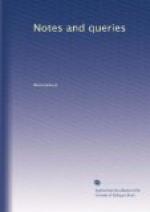“The Several Heterodox Hypotheses, concerning both the Persons and the Attributes of the Godhead, justly chargeable with more inconsistencies and Absurdities than those which have been groundlessly imputed to the Catholic system.” Preached at the visitation of the Bishop of Exeter, 1724.
I shall be glad to learn from any of your readers whether the author published any other sermons or tracts which are not included in the two volumes of his sermons.
WM. DENTON
Shoreditch, Dec. 11. 1849.
* * * * *
ROGER DE COVERLEY.
Sir,—In No. 4 of your “NOTES AND QUERIES” it is asked, if any notice of the tune called Roger de Coverley is to be met with earlier than 1695, when it was printed by H. Playford in his Dancing Master? I am happy in being able to inform your correspondent that the tune in question may be found in a rare little volume in my possession, entitled “The Division-Violin, containing a Choice Collection of Divisions to a Ground for the Treble-Violin. Being the first Musick of this kind ever published. London, Printed by J.P. and are sold by John Playford, near the Temple-Church, 1685, small oblong.”
I have every reason to believe, from considerable researches, that no earlier copy can be found in print.
EDWARD F. RIMBAULT.
* * * * *
MINOR NOTES.
Omission of the Words DEI GRATIA from the new Florin.
Ruding, in his Annals of the Coinage, iv. 9., furnishes a precedent for the omission of the words DEI GRATIA from the coinage, in the case of the Irish half-pence and farthings coined at the Tower in 1736-7. And he supplies, also, a precedent for the dissatisfaction with which their omission from the new florin has been received, in the shape of two epigrams written at that time, for which he is indebted (as what writer upon any point of English literature and history is not) to Sylvanus Urban. The first (from the Gentlemen’s Magazine for June, 1837) is as follows:—
“No Christian kings that I can find,
However match’d or odd,
Excepting ours have ever coin’d
Without the grace of God.
“By this acknowledgment they show
The mighty King of Kings,
As him from whom their riches flow,
From whom their grandeur springs.
“Come, then, Urania, aid my pen,
The latent cause assign,—
All other kings are mortal men,
But GEORGE, ’tis plain,
’s divine.”
The next month produced this address:—
To the Author of the Epigram on the new Irish Halfpence.
“While you behold th’ imperfect
coin
Receiv’d without the
grace of God,
All honest men with you must join,
And even Britons think it
odd.




